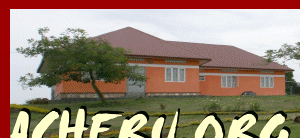| Circular - September 2021: News of former patients, progress with the container, and a shooting in Kampala |
| I've written recently about some of the Acheru patients who, despite the apparent severity of their conditions, required relatively straightforward treatment, made full recoveries, and were soon back home. Others face a longer road, one such being Mubarak. I first wrote about him two years ago, he was paralysed after falling out of a tree then being left to die by his father before being found by a journalist and brought to Acheru. He was in a bad way with deep ulcerated wounds, but more than medical treatment was needed as the Acheru community team sought to bring about a reconciliation with his family - very difficult as Mubarak knew his father had left him to die. Eventually however he did return home, with follow up visits from Acheru. |
| Initial signs were promising. Mubarak, despite all he'd suffered, remained positive. He was provided with a wheelchair and his friends could take him around the village and to school. But sadly it later became evident that there was serious neglect by his father and stepmother. The Acheru team did their best but visits were limited by Covid restrictions, and Mubarak deteriorated. The most recent visit found him very ill with recurring wounds and he had to be taken to hospital. Local leaders became involved, but Mubarak's family failed to engage with those trying to help him. Thankfully an organisation called 'Good Samaritan' has now accepted Mubarak for long term rehabilitation. The neglect he suffered, and the delay in receiving medical attention, has resulted in amputation of his leg, but he is recovering and says 'I am happy staying here because I feel loved and there are many people who help me to do the things I cannot do on my own not like at home. I get food on time and I sleep well in a clean bed. I used to feel so abandoned when I was at home. I used to fall sick for many days without receiving treatment and most of the time I was left alone in the home without help. Washing my clothes was not easy, I used to go for many days with dirty clothes. I just love people from home to come and visit me but I don't want to go back there. Here I have friends who are helping me and we eat and play together. I go to class and study, not like before when I was left in the house. It makes me feel bad that I lost my leg but the doctors told me it was for the best because the wounds were not going to heal and they were making me sick all the time. Now I am used to it and the wound healed well, not like before. |
| Had that journalist not found Mubarak and brought him to Acheru I don't think I would have survived for much longer. There have been other patients too who wouldn't be alive now were it not for our intervention. |
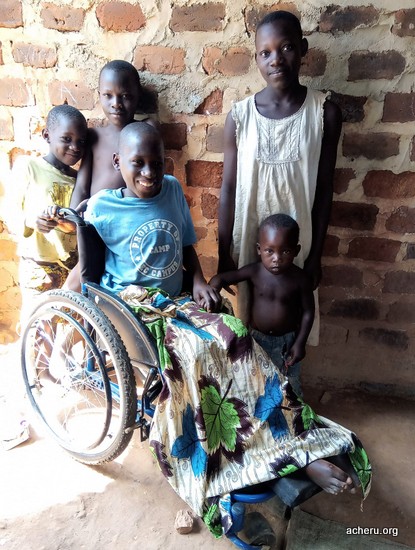
|
| Mubarak in Jan 2020 after his first spell at Acheru |
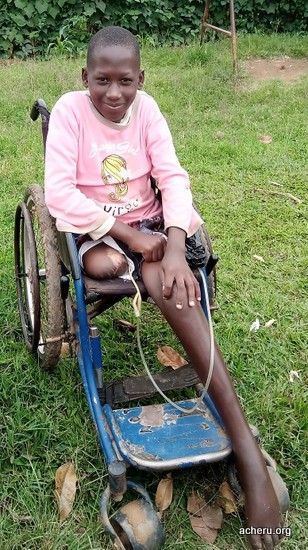
|
| Mubarak now |
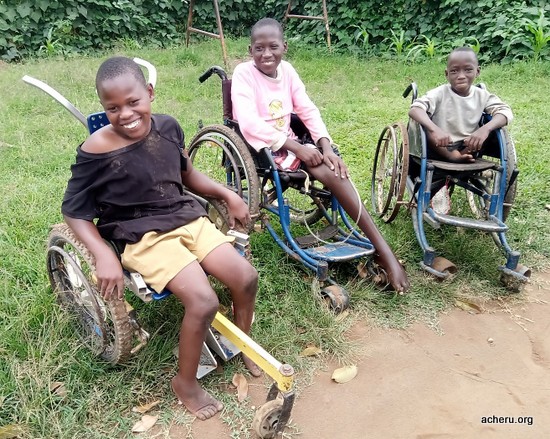
|
| Mubarak with his friends at Good Samaritan |
| Jemima suffered dreadful injuries in a road accident at Luweero and was brought to Kiwoko Hospital, which must have been a horrific journey for her over the rough roads. It's worth remembering that the way so many people travel in crowded buses or on top of lorries often means a large number of casualties when there's an accident, and a consequent influx of patients placing heavy demands on hospitals. |
| I have no doubt that the emergency treatment she received at Kiwoko saved her life, but it was clear that she needed specialist treatment and lengthy rehabilitation, so she was transferred to Acheru. We try to work closely with hospitals; they are in the front line for emergency treatment but can't afford to tie up beds indefinitely, whereas Acheru can deal with longer term needs. I was shocked when I saw the extent of her injuries, I've written about her before, but look at her now. This is why Acheru exists. |
| She is now 13 years old and stays at Kagooge village in Luweero district, but was only five years old when she came to Acheru on 15th March 2013. Recovery took a long time. She had little social life and her self esteem was low. She did not want to talk to people or play with other children. Her mother now says 'I thank God for Acheru and the good work they have been doing for my daughter, we really thought Jemima's leg could not be saved and she would not walk again. She is so active like other children and is very independent. |
| Jemima says 'I am so happy that I can walk around and do everything for myself, I used to be scared of people looking at me but I don't mind now. I am studying so hard to become a doctor and treat sick people'. |
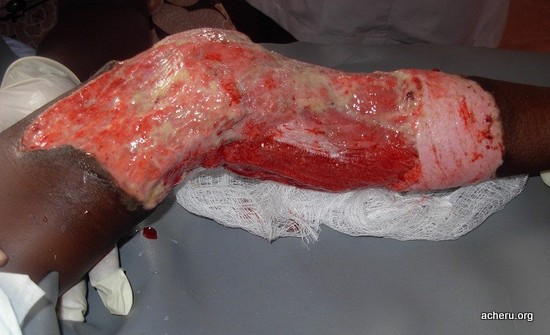
|
| Jemima on arrival at Acheru |
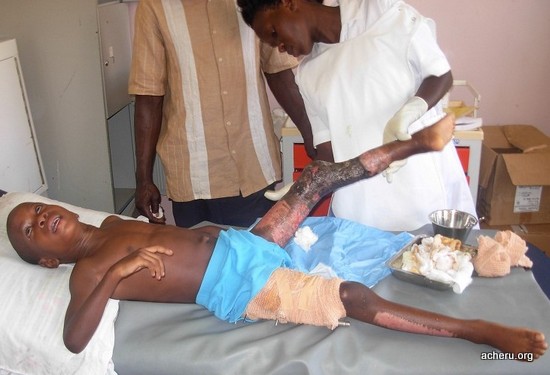
|
| Jemima undergoing treatment at Acheru |
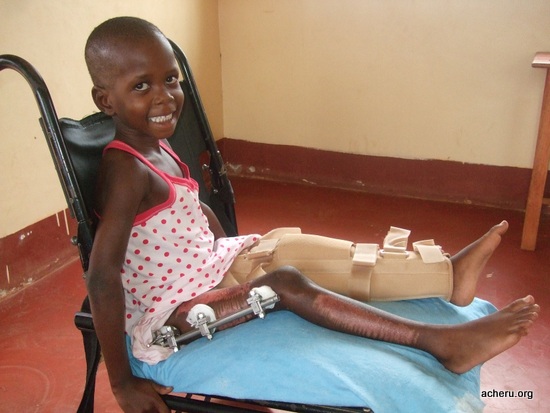
|
| Jemima recovering |
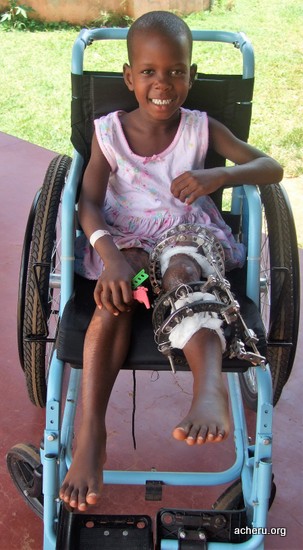
|
| Jemima making progress |
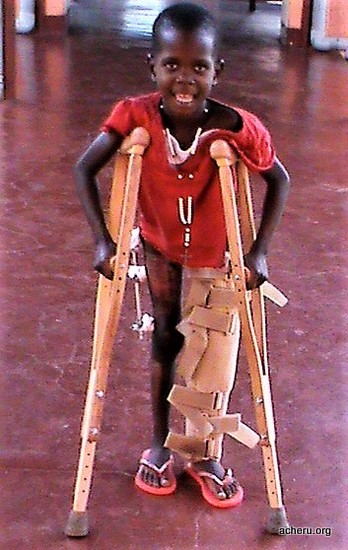
|
| Jemima starting to walk |
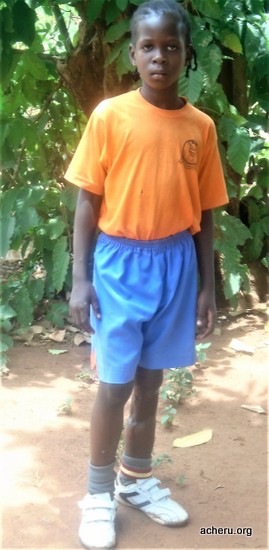
|
| Jemima now |
| Cases like Mubarak's and Jemima's emphasise the need for the follow up work carried out by Acheru to monitor children's progress. Some parents reject the child, don't care about their suffering. Others do care and do their best but a lack of knowledge can still lead to worsening conditions and suffering. And of course we're always very conscious that so many of the conditions we see should have been preventable. Often, when a successfully treated child returns home, we can build on that to help educate a community. |
| Mubarak's and Jemima's injuries were the result of accidents, which I know doesn't fit with some people's definition of 'disabled' but we have no intention of placing such restrictions on Acheru. We don't want to duplicate the work of hospitals or clinics, but to provide a complementary service, assisting children who may not otherwise be helped. |
| I've referred before to some of the conditions we deal with and I've recently reviewed some of the statistics. Numbers are reduced at present because of Covid but the overall balance hasn't changed much. The most common conditions for inpatients are osteomyelitis and cleft lip/palate. For outpatients the most commonly seen problems are club feet and cerebral palsy. For osteomyelitis, cleft palate, club feet, we expect treatment to result in something close to a full recovery with the ability to lead a normal life. With cerebral palsy full recovery is not an option, but that doesn't mean there can't be improvement, and this is often significant with major improvement to quality of life - and proves a real eye opener for parents and others who thought such children were beyond help. |
| The container of medical supplies we sent at the end of June is now in Uganda and I hope by the time you read this the contents will have been distributed. We sent the container as a gift to Kiwoko Hospital, but there's also a lot for other recipients including Acheru, Mukono Hospital, Rapha Medical Centre, and CoRSU. We put a lot of effort into this container, trying to ensure that we sent only what was really needed and also conforming to the various regulations, but we have encountered more difficulties with this container than at any other time since we started this work in 1984. The container was delayed in Mombasa due to mistakes which were entirely out of our control, and there has now been a lengthy delay at Kampala. I hope I'll have more news next month. |
| I also continue to send boxes to Acheru by DHL from time to time, concentrating on things needed by Acheru but which aren't available there, or specialised items they want to pass on to their partners. It's relatively costly to send things this way, but it can be very worthwhile when done selectively. |
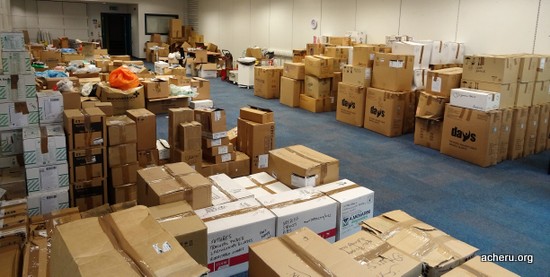
|
| Our store in Carrickfergus |
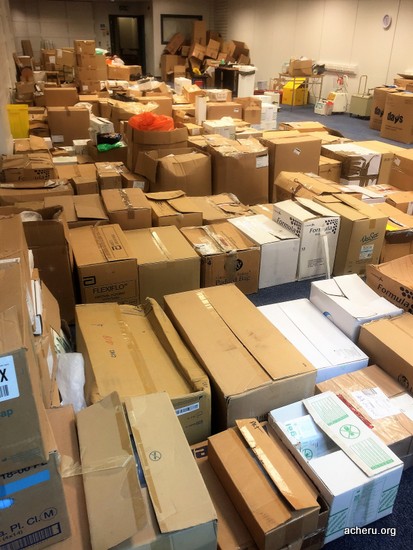
|
| Preparing boxes for the container |
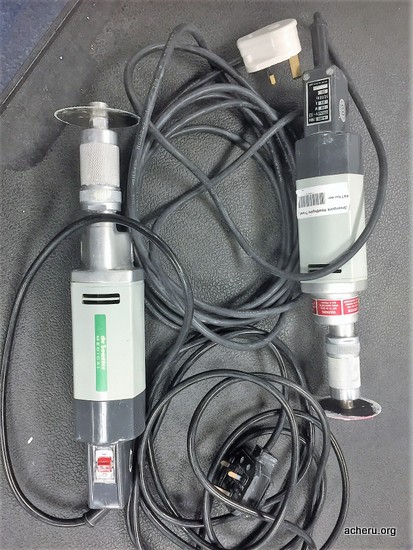
|
| Plaster saws for Acheru |
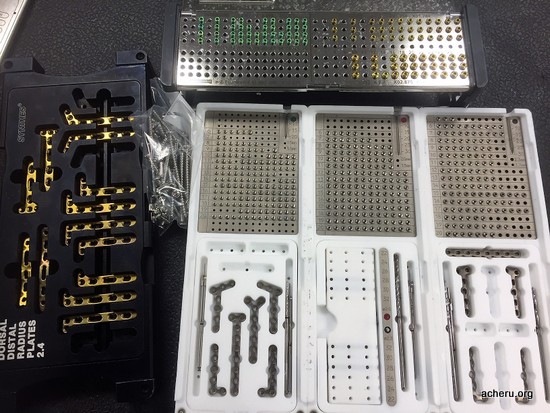
|
| Bone plates and screws for Acheru's partners |
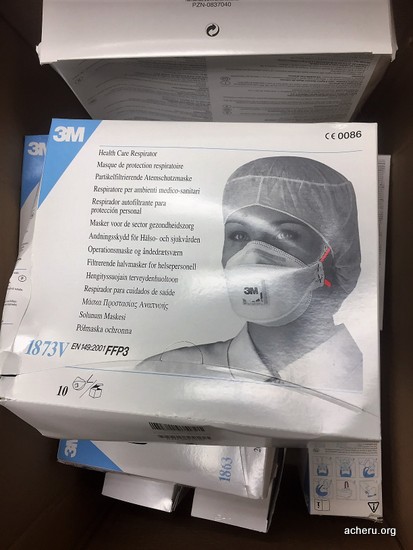
|
| PPE for Acheru |
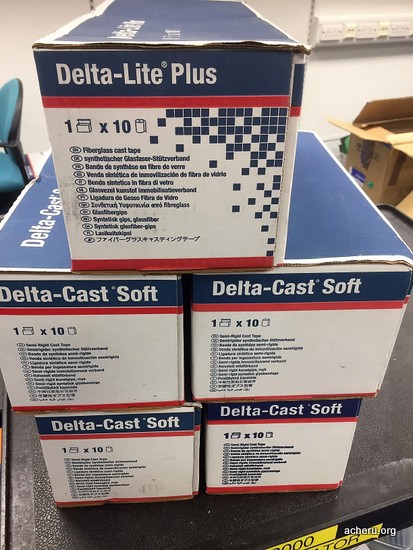
|
| Resin casting materials for Acheru |
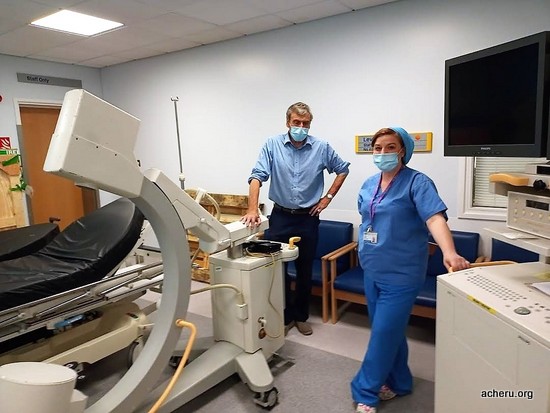
|
| Ray with one of the image intensifiers sent to Uganda |
| Acheru's 'new' Toyota ambulance (a used import from Japan) arrived there some time ago and we were relieved to see that, with the help of Uganda Christian University, the importation process went smoothly. There's a delay in putting it into service; as supplied from Japan the interior is bare so it has to be fitted out with seats, but this has been delayed by Covid restrictions. When ready it should be a real asset to the work. Acheru depends heavily on transport, with the ambulance mainly used to carry children between Acheru and CoRSU, and for clinic runs to the north. This was becoming a problem with the age and high mileage of the old vehicle, so it's our hope that the replacement will prove to be a good investment. |
| We are fortunate in having been able to develop Acheru largely free from interference, and with the cooperation of the relevant government agencies, but we shouldn't forget that Uganda can still be a violent country. I wrote before about some of the violence around the recent elections; sometimes there are attempted assassinations by gunmen on motorbikes who can get away quickly. One such attempt was made on a politician who had proved himself to be a friend to Acheru. |
| General Katumba Wamala was the chief of defence forces, commander of land forces, and formerly the inspector general of police, and is currently the minister of works and transport. In a recent attempt on his life, he was followed from his home by four men on two motorbikes. They opened fire on his vehicle, shooting him in both shoulders. General Wamala has thankfully recovered from his injuries and is determined not to be deflected from what he sees as his public duty, but sadly his daughter Brenda Nantongo and his driver Haruna Kayondo both died in the attack. There has been speculation about why General Wamala was targeted, but he was known to have made enemies when he fired people in higher management for alleged corruption. |
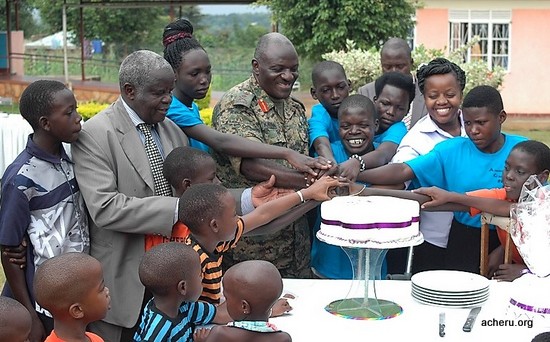
|
| General Wamala at an Acheru Christmas party |
| Acheru has formed a partnership with the new Children's Emergency Hospital at Entebbe, and the first eleven children have been taken for consultation. Three have so far been admitted for surgery, with two operations already carried out. Conditions include webbed feet and fingers, post burns contractures, and cleft lip and palate. The surgery is carried out free of charge, so we hope this will be a fruitful relationship, with Acheru helping locate children in need of help, and dealing with post operative treatment and rehabilitation. |
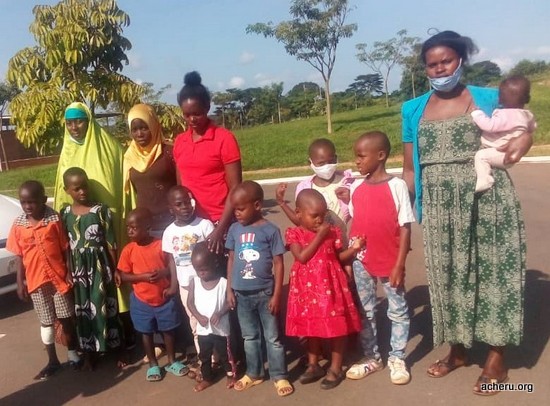
|
| First group of Acheru patients taken to new Entebbe Children's Hospital |
| Brian Dorman |
